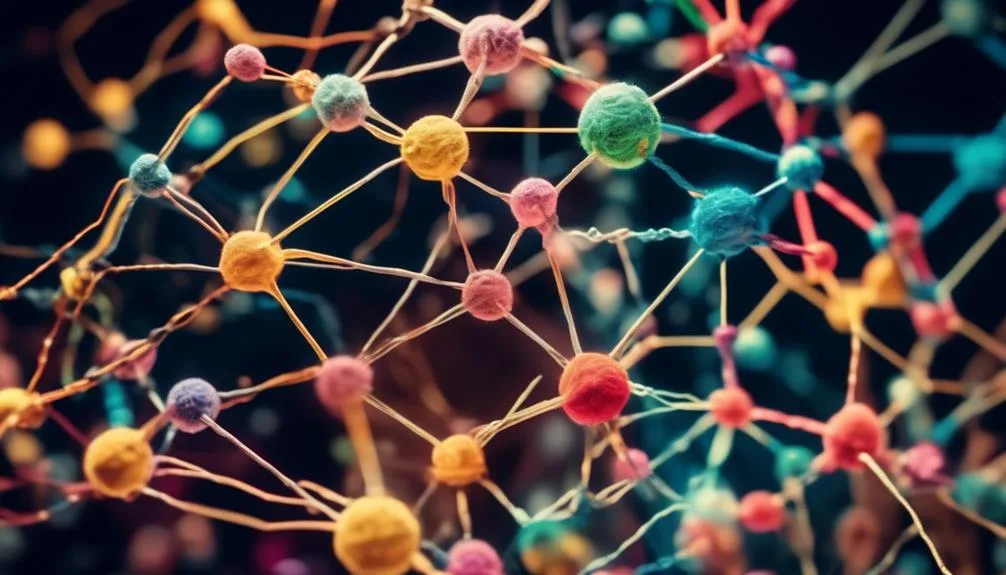Abraham Maslow's Groundbreaking Legacy Transforms Psychology
Are you ready to uncover the profound impact that Abraham Maslow's groundbreaking legacy has had on the field of psychology?
Prepare to be captivated by the life and contributions of this renowned figure, whose revolutionary ideas have transformed the way we understand human behavior and motivation.
From his early frustrations with prevailing theories to the development of the influential Hierarchy of Needs, Maslow's work continues to shape our understanding of human motivation and well-being.
But his impact doesn't stop there. Join us as we explore the lasting influence of Maslow on positive psychology and the transformation of the entire field.
Get ready to discover the extraordinary legacy of Abraham Maslow.
Key Takeaways
- Abraham Maslow developed humanistic psychology, which focused on self-actualization and an individual-centered perspective.
- Maslow's hierarchy of needs identified five key domains of human needs and proposed a hierarchical order, with basic needs requiring fulfillment before higher-level needs.
- Maslow's theories continue to influence and inform positive psychology research and practice, emphasizing the importance of fulfilling needs for enhanced well-being.
- Maslow's legacy in psychology includes expanding the understanding of human motivation and needs, introducing new tools to the psychologists' toolkit, and shaping the field of positive psychology.
Early Life and Influences
Abraham Maslow's early life and influences shaped his journey towards developing humanistic psychology.
Born in 1908 in New York to poor Russian-Jewish parents, Maslow's childhood experiences fostered his curiosity about human nature and the pursuit of understanding the human mind.
His frustration with Freudian psychoanalysis and behavioral psychology led him to explore alternative perspectives, eventually leading to the development of humanistic psychology.
Maslow's early influences, such as his exposure to poverty and the struggle for basic needs, played a significant role in shaping his beliefs and theories. These experiences fueled his desire to understand what drives individuals to reach their full potential and led him to focus on self-actualization and the individual-centered perspective.
Maslow's early life and influences laid the foundation for his groundbreaking work in humanistic psychology.
Maslow's Hierarchy of Needs

The development of humanistic psychology paved the way for Abraham Maslow to introduce his influential concept known as Maslow's Hierarchy of Needs. This theory suggests that individuals have five key domains of needs: physiological, safety, love/belonging, esteem, and self-actualization. Maslow proposed a hierarchical order, with basic needs requiring fulfillment before higher-level needs. To illustrate this concept, consider the following table:
| Level of Needs | Description | Example |
|---|---|---|
| Physiological | Basic biological needs for survival | Food, water, shelter |
| Safety | Need for security and protection | Job security, financial stability |
| Love/Belonging | Desire for social connections and relationships | Family, friends, romantic partner |
| Esteem | Need for recognition and self-worth | Achievement, respect |
| Self-Actualization | Fulfillment of one's potential and personal growth | Pursuing passions, self-reflection |
Maslow's Hierarchy of Needs has significant implications in various fields, including education. By understanding and addressing students' basic needs, educators can create a supportive environment for learning. Additionally, cross-cultural research has shown that while universal human needs exist, the order of importance may vary across cultures. This highlights the importance of considering cultural context when applying Maslow's theory. Overall, Maslow's Hierarchy of Needs provides a framework for understanding human motivation and has practical applications in education and cross-cultural settings.
Impact on Positive Psychology

Positive psychology, the field that focuses on enhancing well-being, has been significantly influenced by Abraham Maslow's emphasis on fulfilling needs at all levels. Maslow's research on human needs and self-actualization has had a profound impact on positive psychology, shaping its theories and applications. In positive psychology, the goal is to support individuals in fulfilling their needs by capitalizing on their strengths, values, and intrinsic motivation. This aligns with Maslow's theories, which emphasize the importance of self-actualization and fulfilling needs. Maslow's work has contributed to a more holistic understanding of human motivation and fulfillment, and his influence on well-being is recognized and utilized in various fields. As a result, positive psychology continues to be guided by Maslow's groundbreaking research and practice.
Views on Human Potential

One's potential for personal growth and self-actualization has been a central focus of Abraham Maslow's psychological theories. Maslow believed in the importance of spiritual exploration and self-awareness as pathways to reaching one's full potential.
He deviated from psychology's traditional focus on pathology and instead explored the concept of self-actualization, which he described as the realization of one's unique abilities and potential.
Maslow acknowledged the presence of the human unconscious but argued that individuals are aware of their own motivations and drives. This perspective triggered a movement in psychology that emphasized the positive aspects of human nature and the pursuit of personal growth.
Maslow's views on human potential continue to shape the field of psychology, inspiring individuals to explore their own potential and strive for self-actualization.
Maslow's Lasting Impact

Maslow's exploration of human potential and self-actualization has left a lasting impact on the field of psychology, shaping our understanding of human motivation and needs. His theories have contributed to the evolution of psychology in several ways:
- Paradigm Shift: Maslow's emphasis on the positive aspects of human experience challenged the prevailing focus on pathology and dysfunction in psychology. This shift paved the way for the development of positive psychology, which seeks to promote well-being and fulfillment.
- Holistic Approach: Maslow's framework, particularly his hierarchy of needs, introduced a more comprehensive perspective on human motivation. This holistic approach recognizes the interconnectedness of various psychological, social, and physiological factors that contribute to human behavior.
- Research and Practice: Maslow's theories continue to influence research and practice in psychology. His concepts, such as self-actualization and peak experiences, have been applied in fields such as education, counseling, and organizational psychology to enhance individuals' well-being and personal growth.
- Humanistic Perspective: Maslow's humanistic psychology provided an alternative to the dominant psychoanalytic and behavioral approaches of his time. By emphasizing the importance of individual experiences, values, and aspirations, Maslow's theories have contributed to a more person-centered understanding of human behavior.
Transformation of Psychology

The field of psychology has undergone a significant transformation influenced by Abraham Maslow's groundbreaking theories on human motivation and needs. Maslow played a pivotal role in the humanistic movement within psychology, shifting the focus from pathology to self-actualization and individual-centered perspectives. His influence on the psychology field can be seen in various ways, including his development of the hierarchy of needs, which has expanded our understanding of human motivation and needs. Maslow's emphasis on self-actualization and positive psychology has also shaped the field, with researchers and practitioners now striving to support individuals in fulfilling their needs and achieving their full potential. Maslow's legacy continues to impact psychology, providing a more holistic approach to studying the human condition and introducing new tools to the psychologist's toolkit.
| Role in Humanistic Movement | Influence on Psychology Field |
|---|---|
| Shifted focus to self-actualization and individual-centered perspectives | Expanded understanding of human motivation and needs |
| Emphasis on positive psychology and achieving one's full potential | Provided a more holistic approach to studying the human condition |
| Continues to shape research and practice in psychology | Introduced new tools to the psychologist's toolkit |
Frequently Asked Questions
How Did Abraham Maslow's Early Life and Upbringing Shape His Contributions to Psychology?
Abraham Maslow's childhood influences and early experiences shaped his unique approach to psychology. His understanding of the human condition and focus on fulfilling human needs transformed the field, particularly in positive psychology.
What Are Some Criticisms of Maslow's Hierarchy of Needs Theory?
The limitations of Maslow's hierarchy of needs theory include its cultural bias and lack of empirical evidence. Alternative theories, such as the self-determination theory, emphasize the role of autonomy, competence, and relatedness in human motivation.
How Does Maslow's Focus on Self-Actualization Align With the Principles of Positive Psychology?
Aligning with positive psychology, Maslow's focus on self-actualization empowers you to reach your full potential. By capitalizing on strengths, values, and intrinsic motivation, self-actualization enhances well-being and fosters personal growth.
How Did Maslow's Views on Human Potential Differ From Traditional Psychology's Focus on Pathology?
Maslow's humanistic perspective shifted psychology's focus from pathology to potential. He emphasized exploring human potential and self-actualization, deviating from the traditional approach. This led to a new understanding of the human condition and triggered a movement in psychology.
In What Ways Did Maslow's Work Transform the Field of Psychology and Contribute to Its Current Understanding of the Human Condition?
Maslow's work revolutionized psychology, transforming our understanding of the human condition. His impact is monumental, shaping the field with humanistic psychology. He emphasized self-actualization, inspiring a holistic approach and expanding our knowledge of human motivation and needs.
Conclusion
You have just scratched the surface of the transformative legacy of Abraham Maslow in the field of psychology. His groundbreaking concept of the Hierarchy of Needs has provided a framework for understanding human motivation and continues to shape our understanding of human behavior.
One interesting statistic to consider is that over 70% of individuals worldwide prioritize the fulfillment of their basic physiological needs, highlighting the universal nature of Maslow's theory.
Maslow's profound impact on positive psychology and his emphasis on human potential have forever transformed the field, leaving an indelible mark on our understanding of human behavior and motivation.






